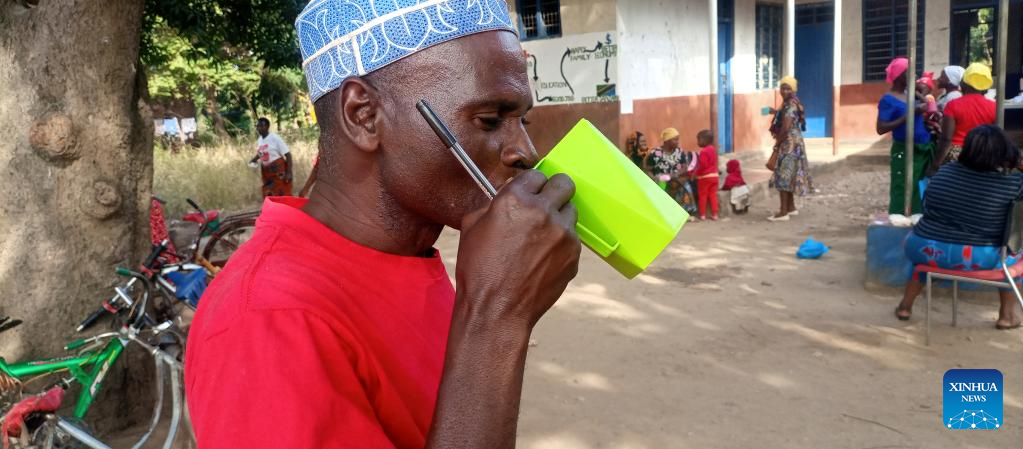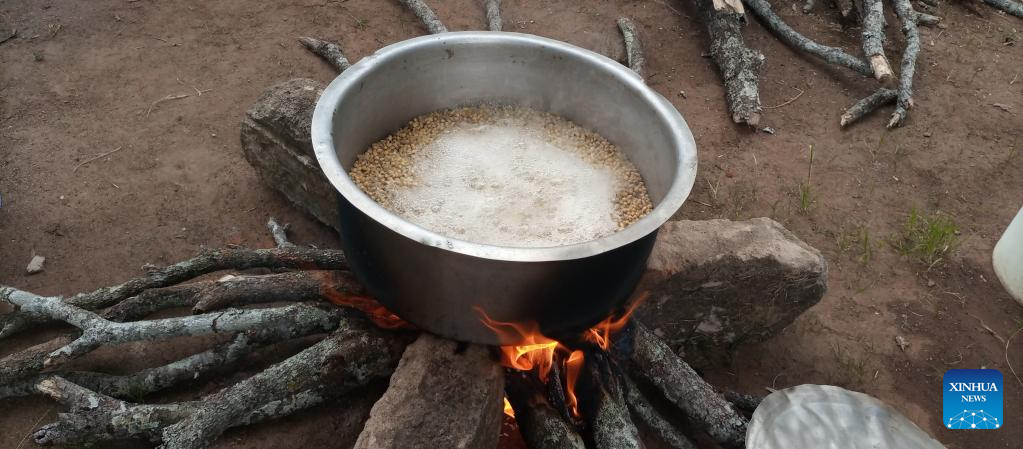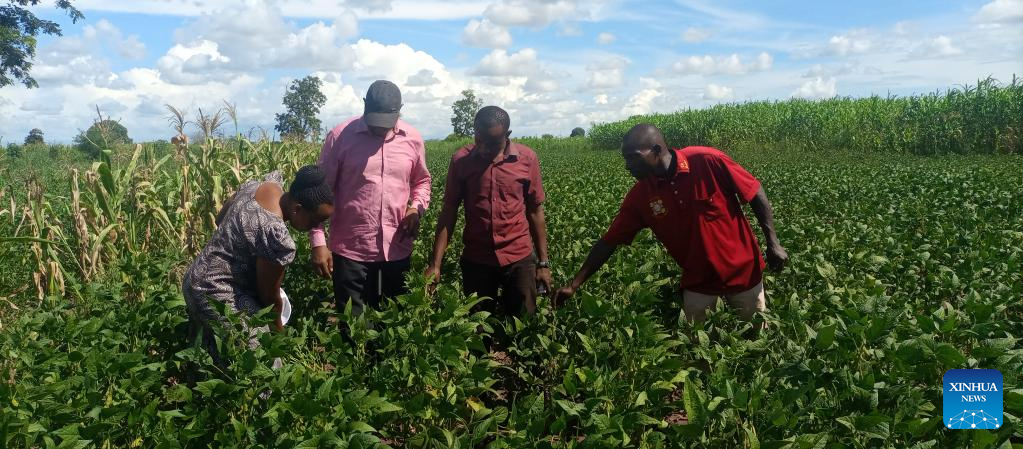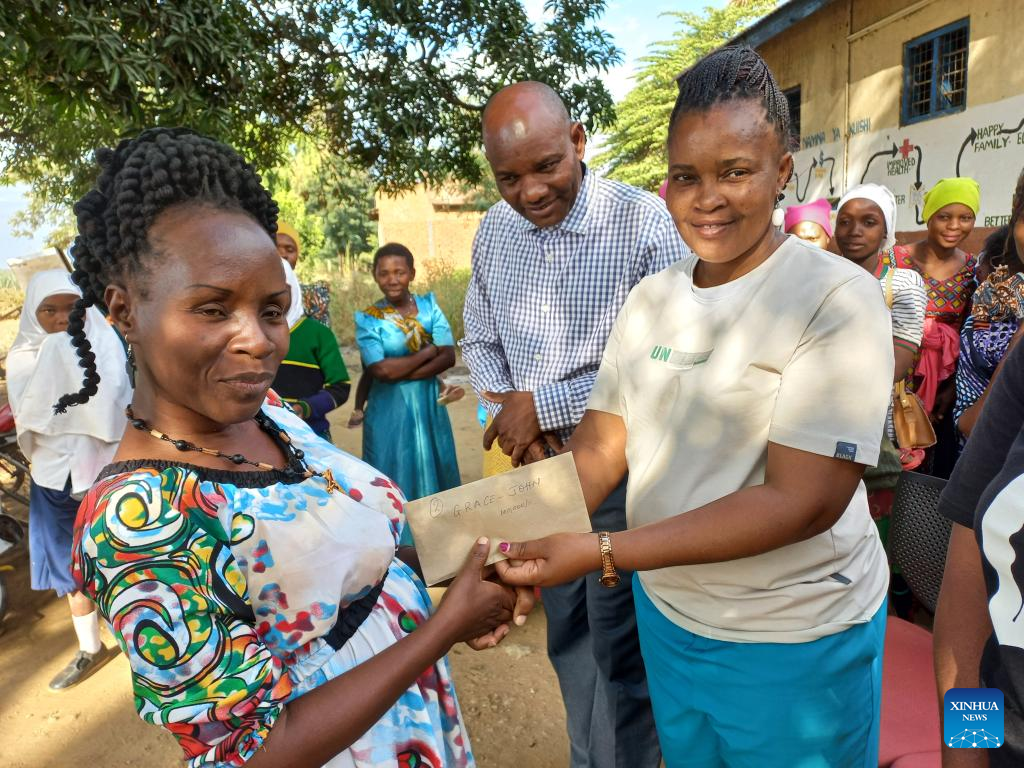Feature: Tanzanian farmers fall in love with Chinese soymilk

A local villager drinks soybean milk in Morogoro, Tanzania, on June 23, 2022. Soy milk, a traditional Chinese drink rich in flavor and nutrition, is becoming an increasingly popular drink among Tanzanians in villages in the Morogoro region west of Dar es Salaam. (China Agricultural University/Handout via Xinhua)
DAR ES SALAAM, July 4 (Xinhua) -- Soymilk, a traditional Chinese drink that's rich in flavor and nutrition, is becoming an increasingly popular drink among Tanzanians in villages in the Morogoro region west of the East African nation's commercial capital Dar es Salaam.
Although soybean milk is new on the menu for Tanzanians, they feel it is delicious. Tatu Seif, a 62-year-old farmer in Kitete village, said soybean milk tastes good. "I like it and hopefully my friends will like it. It's good for our health."
The growing popularity of this new healthy drink has stemmed from a bilateral cooperative project in Tanzania, led by Chinese agricultural scientist Li Xiaoyuan this year.
Li and his team of experts from the China Agricultural University (CAU) had decided to cooperate with the Morogoro authorities to promote the maize and soybean inter-planting project called "Small Bean and Big Nutrition". They selected four demonstration villages of Peapea, Kitete, Makuyu and Mtegowasimba as a pilot project in the region.
Under the project, the experts in collaboration with the Morogoro authorities distributed soybean seeds to farmers in the four villages in January this year and provided on-site guidance on planting and management techniques.
Until late May, a harvest season for the soybeans began, leaving the farmers with broad smiles.
Sixty-year-old Nasoro Athumani was named Peapea village's best soybean farmer for 2022 after his family had grown soybean on a 0.75-acre plot, yielding about 400 kg of the bean.
"Next year I am planning to plant soybeans on two acres," said the farmer with high expectations.
Li said that maize is an important staple food in Africa while soybean can compensate for increased nutrition, adding that inter-planting soybean with maize can improve local nutritional structure more effectively.
Rozalia Grayson Rwegasira, Assistant Administrative Secretary in Economic and Productive Sector of the Morogoro regional commissioner's office, commended CAU for introducing soymilk in the region, saying she expected the soy project to benefit as many people as possible, especially children and women.
Rwegasira said the Morogoro authorities looked forward to strengthening ties with the CAU team of experts and rendering strong support to promoting agricultural cooperation.
"Soybean milk is nice, especially for children under five, pregnant and lactating mothers to improve their health, and the project should reach as many people as possible," she said.
Rwegasira added that the provision of milling machines to make soybean flours will assist farmers to make easily more soybean products and therefore it will also improve the income of farmers through sales of soybean products.
This is not the first time Li Xiaoyun and his team has conducted agricultural aid projects in Tanzania.
Since 2011, CAU has cooperated with Morogoro authorities to carry out the "Big Harvest with Small Technologies" project, which focused on increasing maize production and income.
From just one household in one village in 2011 to more than a thousand households in a dozen villages, participants have more than doubled their maize harvest on average, boosted incomes, and improved their families' welfare and children's education.
The CAU team, despite the COVID-19 pandemic, has managed to continue promoting the project through online guidance. Participants from both sides of the project, through emails, video conferences, as well as a group chat set up on the Chinese social media platform WeChat, are able to communicate the progress of the project in real-time.
Ernest Robert Mkongo, former head of Economic and Productive Sector in Morogoro region, said the China-Tanzania agricultural cooperation program is very crucial in lifting people out of poverty.
Mkongo, who has been Tanzania's coordinator for the project since 2011 and continues to work with CAU after his retirement, said there had never been scholars from any other country who were as diligent as the Chinese experts in visiting farming homes and plots of farmland.
Mkongo is also confident that the local climate, soil and altitude conditions are favorable for soybean growth in Morogoro region, adding that the project will benefit more poor people in the future.
In the future, Li hopes to use soybean milk to improve local nutrition and provide a nutritional alternative to more expensive animal protein, while soybean cakes and maize can be processed into feed and farmed to create a production chain. ■

Local villagers cook soybean milk in Morogoro, Tanzania, on June 24, 2022. Soy milk, a traditional Chinese drink rich in flavor and nutrition, is becoming an increasingly popular drink among Tanzanians in villages in the Morogoro region west of Dar es Salaam. (China Agricultural University/Handout via Xinhua)

Members of the maize and soybean inter-planting project "Small Bean and Big Nutrition" work in a field in Morogoro, Tanzania, on April 21, 2022. Soy milk, a traditional Chinese drink rich in flavor and nutrition, is becoming an increasingly popular drink among Tanzanians in villages in the Morogoro region west of Dar es Salaam. (China Agricultural University/Handout via Xinhua)

Rozalia Grayson Rwegasira (R, Front), Assistant Administrative Secretary in Economic and Productive Sector of the Morogoro regional commissioner's office, presents the award of Peapea village's best soybean farmer for 2022 in Morogoro, Tanzania, on June 23, 2022. Soy milk, a traditional Chinese drink rich in flavor and nutrition, is becoming an increasingly popular drink among Tanzanians in villages in the Morogoro region west of Dar es Salaam. (China Agricultural University/Handout via Xinhua)
Photos
Related Stories
- Algerian, Tanzanian and Zambian FMs to visit China
- Feature: Chinese Juncao technology spells bright future for Tanzania's mushroom growers
- Tanzania recommends adoption of Chinese Juncao technology to promote sustainable agriculture
- Feature: Chinese company protects wildlife while building hotels in Tanzania
- Former African diplomats recall joys at China's restoration of lawful seat at UN
Copyright © 2022 People's Daily Online. All Rights Reserved.









